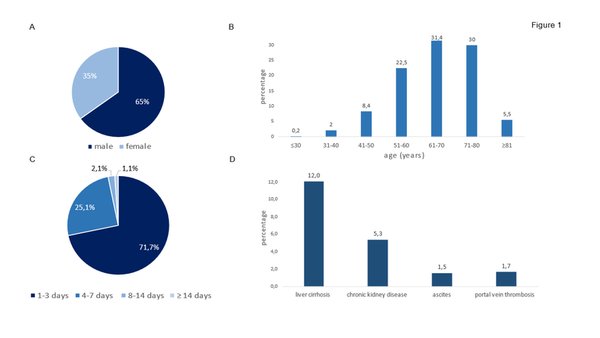-
Home
-
About JCTR
-
Gold Open Access
-
Issues
-
Editorial board
-
Author guidelines
-
Publication fees
-
Online first
-
Special issues
-
News
-
Publication ethics
-
Partners
-
Submit your manuscript
-
Submit your review report
-
Editorial Office
-

This work is licensed under a Creative Commons Attribution-NonCommercial 4.0 International License. ISSN print: 2382-6533 ISSN online: 2424-810X
Volume 9 Issue 2
Selective Internal Radiotherapy in Germany: a review of indications and hospital mortality from 2012 to 2019
Alexander Mertens*, Tobias Essing, Peter Minko, Kathrin Möllenhoff, Katalin Mattes-György, Frederik L. Giesel, Gerald Antoch, Tom Luedde†,
Christoph Roderburg†, Sven H. Loosen†
Mertens et al. J Clin Transl Res 2023; 9(2):9
Published online: March 28, 2023
Abstract
Background & aim: Selective Internal Radiotherapy (SIRT) is a minimal invasive tumor therapy for hepatocellular carcinoma (HCC), biliary tract cancer (BTC), and liver metastasis of extrahepatic tumors. Comprehensive data on past and current trends of SIRT as well as outcome parameters such as in-hospital mortality and adverse events in Germany are missing.
Methods: We evaluated current clinical developments and outcomes of SIRT in Germany based on standardized hospital discharge data, provided by the German Federal Statistical Office from 2012 to 2019.
Results: A total of 11,014 SIRT procedures were included in the analysis. The most common indication was hepatic metastases (54.3%; HCC: 39.7%; BTC: 6%) with a trend in favor of HCC and BTC over time. Most SIRTs were performed with yttrium-90 (99.6%) but the proportion of holmium-166 SIRTs increased in recent years. There were significant differences in the mean length of hospital stay between ⁹⁰Y (3.67 ± 2 days) and 166Ho (2.9 ± 1.3 days) based SIRTs. Overall in-hospital mortality was 0.14%. The mean number of SIRTs/hospital was 22.9 (SD ± 30.4). The 20 highest case volume centers performed 25.6% of all SIRTs.
Conclusion: Our study gives a detailed insight into indications, patient-related factors, and the incidence of adverse events as well as the overall in-hospital mortality in a large SIRT collective in Germany. SIRT is a safe procedure with low overall in-hospital mortality and a well-definable spectrum of adverse events. We report differences in the regional distribution of performed SIRTs and changes in the indications and used radioisotopes over the years.
Relevance for Patients: SIRT is a safe procedure with very low overall mortality and a well-definable spectrum of adverse events, particularly gastrointestinal. Complications are usually treatable or self-limiting. Acute liver failure is a potentially fatal but exceptionally rare complication. 166Ho has promising beneficial bio-physical characteristics and 166Ho-based SIRT should be further evaluated against ⁹⁰Y-based SIRT as the current standard of care.
†These authors contributed equally to this work.

DOI: http://dx.doi.org/10.18053/jctres.09.202302.009
Author affiliation
1. Department of Gastroenterology, Hepatology and Infectious Diseases, University Hospital Düsseldorf, Medical Faculty of Heinrich Heine University Düsseldorf, 40225 Düsseldorf, Germany
2. Paracelsus Medical University, Klinikum Nürnberg, 90419 Nürnberg, Germany.
3. Department of Diagnostic and Interventional Radiology, University Düsseldorf, Medical Faculty, Düsseldorf 40225, Germany
4. Mathematical Institute, Heinrich Heine University Düsseldorf, 40225 Düsseldorf, Germany
5. Department of Nuclear Medicine, University Hospital Düsseldorf, 40225 Düsseldorf, Germany
*Correspondening author
Alexander Mertens
Department of Gastroenterology, Hepatology and Infectious Diseases, University Hospital Düsseldorf, Medical Faculty of Heinrich Heine University Düsseldorf Moorenstraße 5, 40225 Düsseldorf, Germany.
Tel: +49 211 81 16630
Fax: +49 211 81 04489
Email: alexander.mertens@med.uni-duesseldorf.de
Handling editor:
Michal Heger
Department of Pharmaceutics, Utrecht University, the Netherlands
Department of Chemistry, Utrecht University, Utrecht, the Netherlands
Department of Pathology, Erasmus Medical Center, the Netherlands
Department of Pharmaceutics, Jiaxing University Medical College, Zhejiang, China

